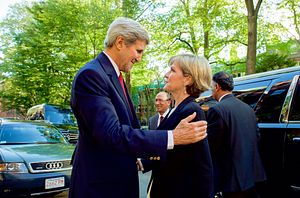The United States should use the upcoming visit of Indonesian president Joko “Jokowi” Widodo to impress upon his administration the benefits of liberal democratic values and engaging the world, Australia’s foreign minister told an audience in Washington, D.C. Wednesday.
Since Jokowi’s inauguration last October, some critics have suggested that his foreign policy has been too inward-looking and nationalistic (See: “Is Indonesia Turning Away from ASEAN Under Jokowi?”). Earlier this year, Indonesia’s relationship with its neighbor Australia had been rocked by controversies over asylum seekers and the execution of Australian drug traffickers, which led Canberra to withdraw its ambassador from Jakarta for several weeks.
Responding to a question on Jokowi’s upcoming U.S. visit later this month following a speech at a D.C.-based think tank, Australian Foreign Minister Julie Bishop took aim at Jokowi’s foreign policy and suggested that the visit would provide an opportunity for Washington to discuss this directly with him.
“President Widodo’s focus has been unapologetically domestic, but there have been some instances of more nationalistic behavior or more protectionist behavior by the administration than perhaps we had expected,” Bishop said at the Center for Strategic and International Studies.
“So here is an opportunity for the United States to impress upon President Widodo the benefits of open, liberal, democratic values and engaging the global order.”
Bishop also reiterated Australia’s concern about the threat posed by the release of hundreds of convicted terrorists from Indonesia, which she also expressed last month in a U.S.-hosted counterterrorism forum on the sidelines of the United Nations General Assembly in New York. She said she expected that the United States would use the visit to boost engagement with Indonesia in the ongoing fight against the Islamic State.
“I’m assuming that the United States will use the opportunity of Widodo’s visit to talk about what more we can do to engage Indonesia in the coalition against terrorism,” she said.
Bishop said that Indonesia, being a moderate Muslim democracy, could play a positive role in countering the narrative of Islamic extremism, and that she was heartened by recent comments by her counterpart Foreign Minister Retno Marsudi on the subject. Bishop’s meeting with Marsudi on the sidelines of the ASEAN foreign ministers’ meeting in Malaysia in August – the first engagement at that level since Canberra withdrew its ambassador – had helped ease tensions.
“We need to work together on the rehabilitation of people convicted of terrorism-related offenses just as we need to work closely with Indonesia on countering terrorism in all its forms in our part of the world,” she said. “We hope that the United States will be able to engage Indonesia in all these areas as we have sought to do.”
Bishop’s address to CSIS came after her attendance at the Australia-United States Ministerial (AUSMIN) consultations in Boston on October 13. The joint statement included a paragraph about Indonesia, recognizing its significant regional role in addressing security challenges including the fight against the Islamic State.
“Acknowledging Indonesia’s important regional role, both countries intend to continue to work with the administration of President Joko Widodo to address regional security challenges, including countering terrorism and countering violent extremism,” the statement read.

































